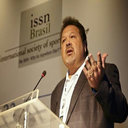Effects of oral D-ribose supplementation on anaerobic capacity and selected metabolic markers in healthy males.
Mo kle
Abstrè
Oral D-ribose supplementation has been reported to increase adenine nucleotide synthesis and exercise capacity in certain clinical populations. Theoretically, increasing adenine nucleotide availability may enhance high intensity exercise capacity. This study evaluated the potential ergogenic value of D-ribose supplementation on repetitive high-intensity exercise capacity in 19 trained males. Subjects were familiarized to the testing protocol and performed two practice-testing trials before pre-supplementation testing. Each test involved warming up for 5 min on a cycle ergometer and then performing two 30-s Wingate anaerobic sprint tests on a computerized cycle ergometer separated by 3 min of rest recovery. In the pre- and post-supplementation trials, blood samples were obtained at rest, immediately following the first and second sprints, and following 5 min of recovery from exercise. Subjects were then matched according to body mass and anaerobic capacity and assigned to ingest, in a randomized and double blind manner, capsules containing either 5 g of a dextrose placebo (P) or D-ribose (R) twice daily (10 g/d) for 5 d. Subjects then performed post-supplementation tests on the 6th day. Data were analyzed by ANOVA for repeated measures. Results revealed a significant interaction (p =.04) in total work output. Post hoc analysis revealed that work significantly declined (-18 +/- 51 J) during the second post-supplementation sprint in the P group while being maintained in the R group (-0.0 +/- 31 J). No significant interactions were observed in peak power, average power, torque, fatigue index, lactate, ammonia, glucose, or uric acid. Results indicate that oral ribose supplementation (10 g/d for 5 d) does not affect anaerobic exercise capacity or metabolic markers in trained subjects as evaluated in this study.


